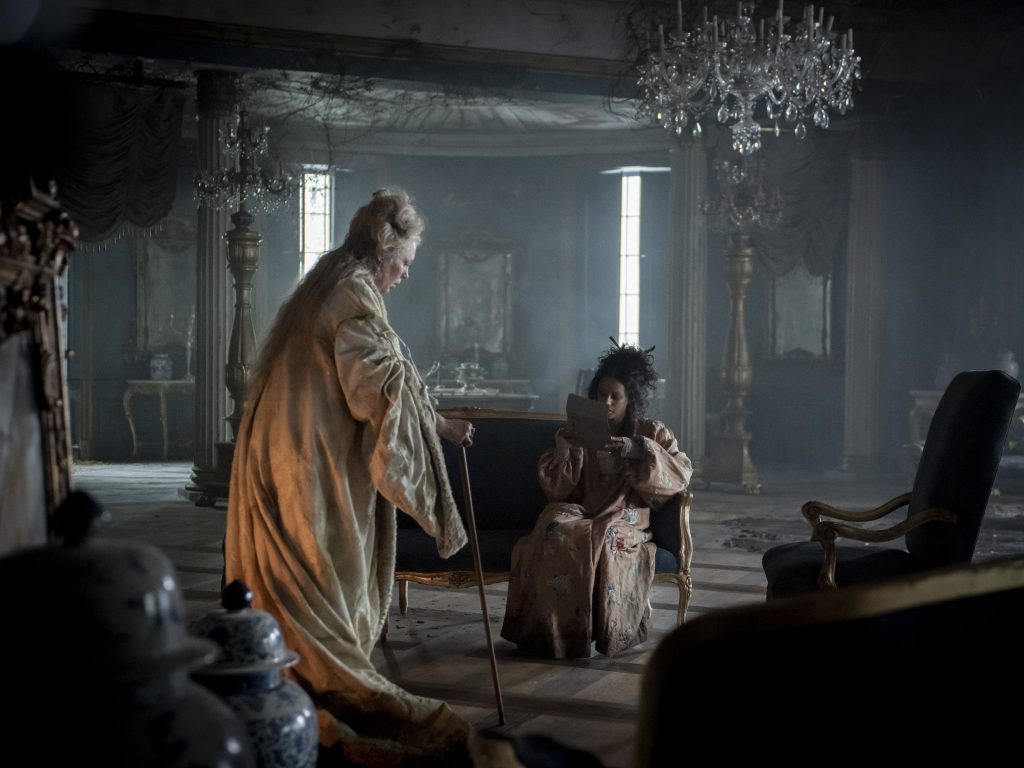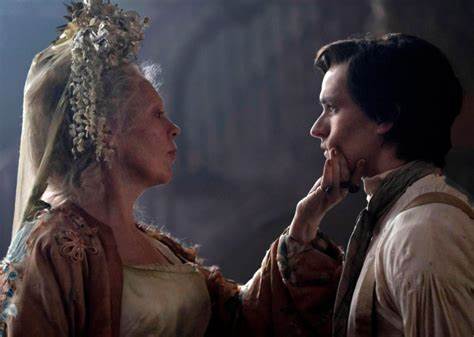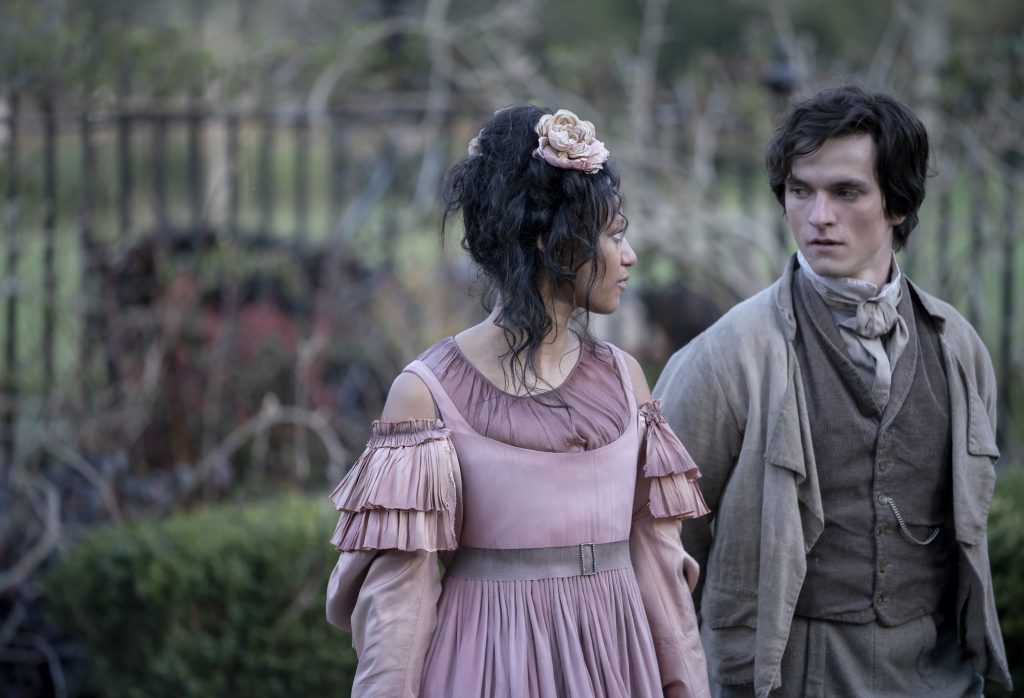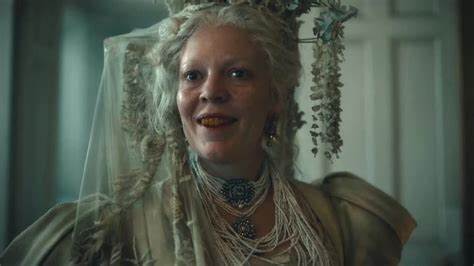
Charles Dickens’s thirteenth novel Great Expectations, published in 1860, tells a tale that could be told throughout human history. It examines issues of class, patriarchy, the weaponization of emotion, and manipulation. Young Pip leaves his humble and abusive rural home, to avoid becoming a blacksmith like generations of his family. He takes a position as companion to the reclusive Miss Havisham in hopes of working his way up the social ladder. Still wearing her rotting wedding dress, she is bent on revenge on men after she was left at the altar. Her weapon? Young and willing ward Estella. Pip walks right into their trap. The Disney+ limited series stars Olivia Colman as Miss Havisham, Fionn Whitehead as Pip, and Shalom Brune-Franklin as Estella, with costar Ashley Thomas as the feverishly handwashing lawyer Jaggers. Steven Knight’s explosive adaptation debuts April 28th on Disney+. What She Said’ Anne Brodie had the chance to take part in a global event with the stars:
Anne Brodie: I want to thank you for delving back into our literary past. It’s vital to look back works that were created before us. And I’m so glad that you’ve dug back here and found something that’s so relatable to modern audiences. And Fionn, perhaps you can tell me, as a modern young man, does this make you want to explore what is already out there?
Fionn Whitehead: Yeah. Definitely. I think that there are so many of these classic texts. The reason that- as you know, as he said, the reason they’ve stood the test of time is because of the stories. It’s just a matter of delving into them. Some of them, are quite inaccessible for some younger people now, just because of the language and the way that it’s written. But when you can sort of decipher that, so much like getting a magic code, or when you can decipher that and actually get to the meat of the story, your eyes are opened to this whole, whole new world that is exciting and interesting. And I think that is really important. And particularly important to open up to the generation of young people who might never have had the chance of reading this kind of work, or might never have had the interest in reading it.

Director-writer Steven Knight – “I think any great work of literature is pretty timeless when it deals with the human condition and the way things are, but I think it’s particularly timely in that it’s about class, someone who is trying to escape from their destiny. , I’m speaking for England but things are getting pretty tough, and things were pretty tough for Pip, so I think it is very relevant.
Miss Havisham runs people with an iron fist, like Estella whom she trained to make men suffer as payback for being left at the altar years before. Miss Havisham is powerful but she’s no feminist icon.
Olivia Colman – My idea of feminism is equality, not hatred, and, she teaches Estella to be a weapon to pay back men and, and to hate men. And she says, “In a, in a marriage, you’re the winner if you don’t, if you’re not one that loves.” She was ahead of her time and determined not to need men, but it’s not how I see feminism. And she allows men to hurt her. She’s pretty cool, forceful, and scary but again, I’m not sure any of those things are flattering toward feminists. I know plenty of men who are feminists and it’s about equality and thoughtfulness and caring I think.”

Shalom Brune-Franklin – If you’ve been raised a certain way and told and made to believe a certain thing, but then when you start to go out into the world and have a little bit of an experience of the world for yourself, you start to see that it’s not all these things that you’ve been told, and so you’re incredibly confused. I don’t think Estella has the tools or the ability to be able to understand and navigate her way through that world, because Miss Havisham hasn’t given her the best toolkit.
How did Colman and Brune-Franklin reconcile their characters’ cruelty, hurting this very sweet boy, and setting him up to suffer for the crimes of the male species?
Brune-Franklin – For the character of Estella, I think pleasing Miss Havisham is, is her main goal. It’s more about keeping Miss Havisham happy. I think that’s obviously a really toxic and horrible relationship that she’s having to navigate and grow up in. I think Miss Havisham would have been a lot nicer to her if she just did as she was told and was cruel to this boy, and so she did exactly that.
Colman – I feel sad that Miss Havisham managed not to meet any really good, nice men (laughs), so she decided everybody was in the same mould as Compeyson and, uh, missed out on what could have been. You know, she could have washed her hands off him and moved on, giving her and Estella a much nicer life. But back in those days, of the full-on patriarchy they were stuck, they couldn’t work, couldn’t do anything, so it was going to have to be marriage, and her only insight into marriage was horrendous. So poor Estella was sort of screwed from the outset really. Shame.

I still struggle with the fact that it depends on where you’re born very much as how people will see you. And I think that’s rubbish but that it’s still very much a case for many people. They didn’t have the opportunities that other people who were born in a different place, have. That still resonates with me, and it’s still frustrating. Miss Havisham I didn’t necessarily find much personally to connect with. Other than I know what it’s like to love, and I know the pain she must’ve felt when that fell apart.
Great Expectations begins on Disney+ April 28th